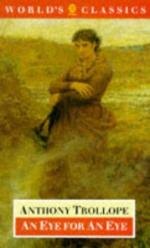And so Fred Neville was the Earl of Scroope. Not that he owned even to himself that the title and all belonging to it were as yet in his own possession. Till the body of the old man should be placed in the family vault he would still be simply Fred Neville, a lieutenant in Her Majesty’s 20th Hussars. As he travelled home to Scroope, to the old gloomy mansion which was now in truth not only his home, but his own house, to do just as he pleased with it, he had much to fill his mind. He was himself astonished to find with how great a weight his new dignities sat upon his shoulders, now that they were his own. But a few months since he had thought and even spoken of shifting them from himself to another, so that he might lightly enjoy a portion of the wealth which would belong to him without burdening himself with the duties of his position. He would take his yacht, and the girl he loved, and live abroad, with no present record of the coronet which would have descended to him, and with no assumption of the title. But already that feeling had died away within him. A few words spoken to him by the priest and a few serious thoughts within his own bosom had sufficed to explain to him that he must be the Earl of Scroope. The family honours had come to him, and he must support them,—either well or ill as his strength and principles might govern him. And he did understand that it was much to be a peer, an hereditary legislator, one who by the chance of his birth had a right to look for deferential respect even from his elders. It was much to be the lord of wide acres, the ruler of a large domain, the landlord of many tenants who would at any rate regard themselves as dependent on his goodness. It was much to be so placed that no consideration of money need be a bar to any wish,—that the considerations which should bar his pleasures need be only those of dignity, character, and propriety. His uncle had told him more than once how much a peer of England owed to his country and to his order;—how such a one is bound by no ordinary bonds to a life of high resolves, and good endeavours. “Sans reproche” was the motto of his house, and was emblazoned on the wall of the hall that was now his own. If it might be possible to him he would live up to it and neither degrade his order nor betray his country.
But as he thought of all this, he thought also of Kate O’Hara. With what difficulties had he surrounded the commencement of this life which he purposed to lead! How was he to escape from the mess of trouble which he had prepared for himself by his adventures in Ireland. An idea floated across his mind that very many men who stand in their natural manhood high in the world’s esteem, have in their early youth formed ties such as that which now bound him to Kate O’Hara,—that they have been silly as he had been, and had then escaped from the effects of their folly without grievous damage. But yet he did not see his mode of escape. If money could do it for him he would make almost




